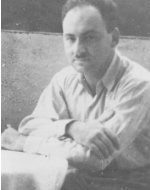Manesbach, Eliezer-Haim
Son of Zelma and Moshe, was born on June 30, 1902 in Karlsruhe, Germany. Irwin grew up in a cultural and educational home, and by the age of Bar Mitzvah he was also active in the Jewish community in the city. At that age he began to integrate into the Blau-Weiss youth movement and began to move away from Jewish-religious activity. He studied at the universities of Freiburg, Bonn and Berlin and graduated with honors and a doctorate in medicine and dentistry. For the next five years he worked in his profession at the large dental clinic of the Krupp factory in Essen, Germany’s heavy industrial factory. He was promoted to the rank of chief assistant, to the displeasure of his co-workers, who were relieved that a Jew had received such a prestigious appointment. In one of his letters from those days, he expressed his fears about a growing Germany, adding that if he had to enlist in the German army he hoped to serve only in the medical corps “so as not to serve as cannon fodder.” Under the influence of one of his teachers, he outlined his own path in his profession: social dentistry based on preventive medicine, and the need for health insurance in general and dental health in particular. His home served as a center for extensive Zionist activity and a meeting place for emissaries from Eretz Israel. Before immigrating to Israel he married Aliza and the couple had two daughters: Deborah and Shoshana. Erwin immigrated to Israel with his family in 1933 and settled in Tel Aviv. A short time after his immigration to Israel he was appointed Chief Dentist of the Dental Association Dr. Mansbakh was involved in the study of tooth decay and the interrelationship between oral diseases and body diseases – what is now called “holistic medicine” “He said. Among his many roles were professional counseling in schools in Tel Aviv and Jerusalem, as well as systematic treatment of schoolchildren’s teeth. With the rise of Hitler to power and the mass immigration to Israel, Dr. Mansbach devoted himself to the absorption of dentists among the new immigrants and to their arrangement in their profession throughout the country.Mansbach and his family were among the first settlers in Kiryat – As usual, he enlisted here for public service, and served as chairman of the technical department of the city council. During the 1936-1938 riots he joined the Haganah and maintained the community, and with the help of other doctors, the medical system was built in the Yishuv. The prize money Arwin received for his jaw health research was devoted to the purchase of a certificate for bringing his father to Israel, who survived the death camps. In 1947, his father arrived in Israel as the old man on the ship “Champolion.” During the War of Independence he worked to establish mobile dental clinics to treat soldiers on the battlefield. At that stormy time he wrote his daughter Deborah a letter saying, “The general danger almost gave me cheerfulness, there is nothing to watch out for, every place is dangerous, but life is so big and precious that I live it fully.” I had several periods in life that resembled that of now, But this is the greatest, because this is the birth of our people. ” On 27 March 1948, he was hit by a bullet fired from the direction of Abu Kabir while he was sitting at his desk. He was taken to Beilinson Hospital where he died of his wound and was brought to rest in the Nahalat Yitzhak Military Cemetery. On the 30th day of his death, the Tel Hashomer dental clinic was named after him. The symbol of his city Holon is determined by a photograph he made, and it shows the sycamore tree growing in the sands of Holon.
